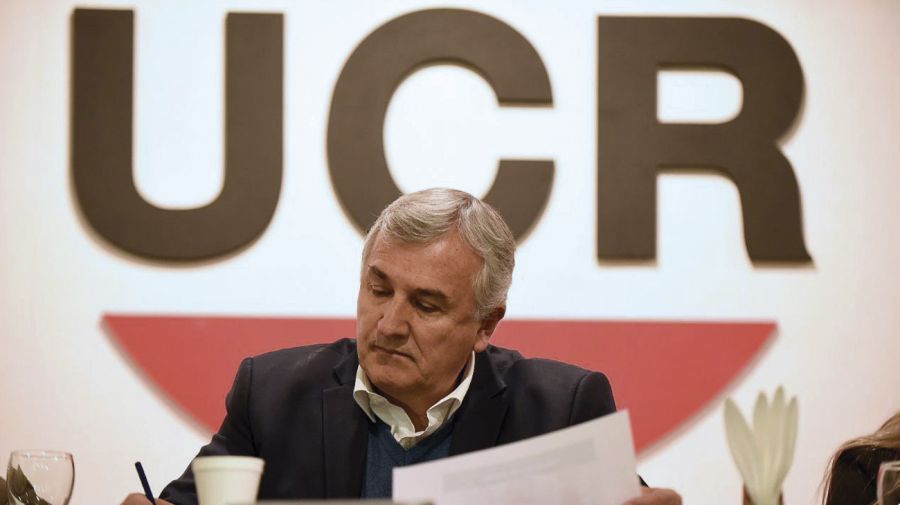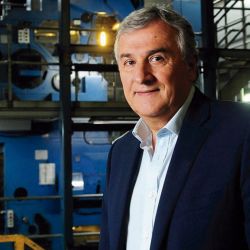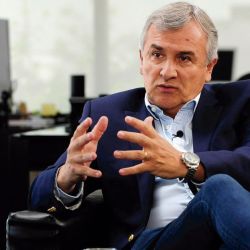Gerardo Morales, Jujuy Province governor, Radical party chairman and possible presidential hopeful in this year’s elections, admits his plan for an exclusively UCR primary with Facundo Manes has been frustrated.
The 63-year-old clears up doubts concerning tensions within the party as to its choice of candidates and stakes his bets on the unity of the opposition Juntos por el Cambio coalition.
It is said, as you will have heard so often, that the Radicals are in line for the vice-presidency but not the presidency and that the real objective of several Radicals is to be the running-mate of some PRO candidate. Does that strike you as an unfair accusation?
I don’t know if I’d call it an accusation, but it is a given situation. I believe that some leaders do have that Plan B in the face of the realities of voting intentions, etc. But the objective and the challenge which I have set myself is to be President of Argentina and I feel up to that responsibility, I’m totally convinced of that.
But whatever the plan, it seems to me that its priority must be that we can reach the presidency with a shared ticket because no single leader or force can go it alone and nobody should fight that. A pure PRO ticket like [Mauricio] Macri and [Gabriela] Michetti [in 2015] will not work any more and nor would a 100 percent Radical ticket seem a good signal to me nor of any of the parties forming Juntos por el Cambio because it would take us away from that central idea of a coalition government, which we could not achieve between 2015 and 2019.
That is the challenge which Frente de Todos has not managed either – they are a tremendous witches’ Sabbath, complete anarchy. So that challenge of politics is how we learn to govern as a coalition, looking at what happens in European coalitions where the extremes normally end up governing, towing the public policies of coalition governments. The challenge of coalitions is to look for the middle ground when making rational decisions. So that seems to me the path which Argentine politics must follow.
You have said that there was a leadership crisis in Juntos por el Cambio. Will this year’s PASO primaries resolve that leadership crisis, lining everybody up behind the candidate who emerges elected?
I think so, some might be unwilling but I see a will to strengthen Juntos por el Cambio, even in the most radicalised sectors, which are very small minorities. I would say that the thinking in most of my party is: “We’re not going to play a secondary role and nor would we accept anybody laying claim to owning the coalition but there are good vibes” and the truth is that I’m pretty optimistic as to the attitude and the energy. When we work as a team, the energy flows and I see that happening in Radicalism and throughout Juntos por el Cambio – I’m very optimistic with plenty of energy in that direction.
By the same token that the Radicals have underlined that moving closer to [libertarian deputy] Javier Milei is impossible for the Unión Cívica Radical, do you view as possible a rapprochement between Juntos por el Cambio and the non-aligned Peronists within Frente de Todos, such as those of Córdoba, for example? I remember that famous asado barbecue when you joined [Córdoba Governor Juan] Schiaretti, [Salta ex-governor Juan Manuel] Urtubey and [ex-minister Florencio] Randazzo...
After that asado, Urtubey ended up at a Kirchnerite rally in Mendoza, as I recall. And the problem with Schiaretti is that he never defines himself, he’s always hanging around. In my eyes he’s a great governor, a great political leader and also a rational man. I talk a lot to him, I share much of his vision of the country and also of federalism. But I don’t think that project is viable – it would be good if it were but it’s not. What is viable is dialogue with Schiaretti because he’s a person of dialogue, he’s a sensible person. The Peronist government model is in a process of exhaustion in Córdoba, that’s why I’m convinced that we in Juntos por el Cambio are going to govern that province. But beyond the situation in such an important province as Córdoba, I would say that Schiaretti in any case belongs to that group of leaders with whom it is possible to dialogue and reach points of agreement, even from another political party. For that reason we do not only have to think of moving together in the same political coalition. That is not necessary, what I believe to be necessary is that dialogue be the attitude, whether you win or lose. When you lose, your attitude must also be dialogue and if you win, your vocation must be to seek dialogue.
You have said, concretely defying ex-president Macri: “The elections will be a real thrashing if he’s the candidate.” Do you think that the fact that Cristina Fernández de Kirchner has announced that she will not be running for anything in the next elections reduces the possibilities of Mauricio Macri running because the antinomy with Fernández de Kirchner was what most permitted his candidacy?
I thought at some point that he could be the candidate but I don’t think so any more. Nowadays I see him in a more positive role from the viewpoint of offering opinions from outside, as the leader of PRO but as one of the leaders, not the leader of Juntos por el Cambio. I see him with more poise as a politician. I sometimes do not share some of his opinions but he is there for a personal discussion in any event. It seems to me that the PRO candidates are [Buenos Aires City Mayor] Horacio [Rodríguez Larreta] and [party chair] Patricia [Bullrich].
Does the fact of Cristina Fernández de Kirchner not running modify somewhat the Juntos por el Cambio map between the possible alternatives of the best candidates being closer to the extremes or to the middle ground? You must have heard that ironic crack about Juntos por el Cambio being Juntos por Cristina.
Yes, there’s something in that, partially. Juntos por el Cambio is obviously more than that because it is the possibility of expressing society’s expectations and solving the country’s problems, which is the challenge we face. But I don’t think the strategy we are going to develop has anything to do with Cristina’s decision, I’ve never thought that way. When I made the decision to work towards being President of Argentina, I never thought of Cristina doing this or that and nor do I see that thinking in Juntos por el Cambio. I think she announced her decision following her conviction, which has yet to be upheld, and it seems to me that this triggers a new debate within Frente de Todos, thus also giving them an opportunity to renew [their leadership].
I believe that Kirchnerism has to understand that its time is up, in my opinion, and I think that Argentine society as a whole is waiting for them to recognise: “That’s it, our time is up, we did some things well and others badly.” In my opinion, they have damaged Argentine society culturally, installing a matrix of corruption and, in some cases, violence, as was the case of Túpac [Amaru] in the province of Jujuy, among other Kirchnerite organisations. But in any case Cristina stepping aside could be healthy for the more rational Peronist sectors. Kirchnerism and La Cámpora [militant youth grouping] should understand this situation.

You mentioned that you were convinced that Juntos por el Cambio was going to win the gubernatorial elections in Córdoba. Are you inclined towards a Radical candidate like [Rodrigo] De Loredo, for example?
Yes, I’m leaning that way. When that situation was in doubt, well, not in doubt but there was no time for definitions, I was one of the first to say that Rodrigo had to be the gubernatorial candidate for Radicalism. There’s also [Senator] Luis Juez, who’s a good candidate too. So the important thing there is to maintain the unity of Juntos por el Cambio because Luis Juez does not arrive by himself and nor do we. But obviously as the Radical party chairman I’m supporting Rodrigo de Loredo as gubernatorial candidate.
Turning to the City of Buenos Aires housing the Radical headquarters and also the base of PRO as the first neighbourhood party, how does it strike you to see, for example, Patricia Bullrich backing the candidacy of Jorge Macri while Horacio Rodríguez Larreta simultaneously supports that of [Radical Senator] Martín Lousteau and [City Health Minister] Fernán Quirós?
We must wait still; our candidate is clearly Martín Lousteau. I wouldn’t say that he is Horacio’s candidate, there is an excellent relationship between the Radicals and the PRO government of the City and there will be a couple of PRO candidates. What we are proposing is to have the opportunity to present our own candidate. Martín has very good popularity ratings, and would be a great mayor and a safe bet. I would say that every Radical stands unflinchingly behind him but we must wait to see what happens within PRO. We have already defined Martín Lousteau as our City candidate with the support of the entire Unión Cívica Radical.
Could it be said that the Radicals feel closer to Horacio Rodríguez Larreta than to the so-called PRO hawks, or Macri and Patricia Bullrich to put it more concretely?
In general, what I am hearing from most Radical leaders is that there is a more rational dialogue and more possibility of reaching an understanding with Horacio. That’s not my case, I have an excellent dialogue with Patricia and also with Horacio but in general I would say that there is a perception in most of the party of Horacio offering the greater possibility of dialogue, even when we are disputing the presidency of the country with PRO with him as our adversary. That’s how most Radicals feel on that point.
You know [Economy Minister] Sergio Massa like few opposition leaders. You even proposed at Gualeguaychú when Cambiemos was formed that the alliance should include Massa’s Renewal Front. If Massa really lowers inflation, would he end up representing Frente de Todos in the PASO primaries or as the winner there?
It’s possible, the relationship with Sergio Massa has been going on for a long time now – he was in the opposition back then and now he has become almost K[irchnerite]. If he has success handling the economy, he is a possible candidate.
I’m one of the northern governors – eight of us are Peronists and two Radicals. What I do see is that the governors in general could be repositioning towards dialogue. That’s why I said earlier that Cristina stepping aside could be an opportunity for a more rational country. I hope that La Cámpora and Kirchnerism understand that because it would do the country good. I believe that there is an opportunity there and it seems to me that Sergio Massa might have that potential but there are also leaders and governors who are working well with a vision of the country and I think that there are going to be alternatives there too.
The problem of Frente de Todos is its anarchy. I don’t know by what process they are going to define their leader because their problem is leadership with Cristina, who is clearly the Frente de Todos leader, moving aside – the challenge is who is going to be the leader because today the country has a president absent from the everyday decision-making to resolve Argentina’s problems. And that political conflict is creating problems for the economy and politics. That’s why the country needs a change and a rational Juntos por el Cambio with a plan and governing as a coalition. Because I do not believe that they can resolve those problems, no matter who is their candidate.
Do you believe that lithium will be a turning-point for a future trade surplus for Argentina as a whole and that we have found the true white gold there?
I’m convinced of that, following on from copper. I was with people from Chuquicamata, Chile, in Panama, with a representative of Codelco and [copper] production there is already on the decline. We’re just beginning with copper with important projects in San Juan, Taca Taca in Salta and Catamarca so we have a lot of copper to offer the world. And as for lithium, we’re already in the process of increasing production – Jujuy will produce 82,500 tons this year. Just Jujuy will be exporting US$3 billion this year and US$4 billion next as against US$3.2 billion for all Argentine mineral exports in 2021. Salta and Catamarca will be joining in later and within four years we three provinces will be exporting over US$10 billion just in lithium. Within those four years copper will be joining the critical minerals to manufacture batteries to accumulate renewable energy, not only for electromobility but on a grand scale, or for households and mobile telephones, among other uses.
There is a really huge demand for critical minerals and Argentina forming part of the lithium triangle with Chile and Bolivia plays a central role. We also occupy an important place in Latin America because only Mexico, Brazil and Argentina have strong auto industries so that our auto industry will be a key to our advance in electric cars and electromobility. So the challenge is to add value, not merely producing lithium carbonate of battery quality but also to manufacture the battery itself, which today is the auto part representing half the cost of an electric car due to the international prices of lithium . This year the royalties entering the province of Jujuy will be US$250 million to US$300 million, so that is a central challenge there. That is going to be one of the new axles of the productive matrix alongside energy, specifically green hydrogen and Vaca Muerta [shale] during that window of 25 to 30 years we’re going to have until the matrix of generating energy changes worldwide. But with Vaca Muerta they’re already working on the [gas] pipeline and they’re going to double the oil pipeline, the one running to Bahía Blanca, so that next year we’re going to export US$6.5 billion in crude oil, double what we are exporting now. If you add the gas exports of US$3.5 billion to Chile, that great revolution triggered by Vaca Muerta will already start making an impact next year after investing US$5 billion last year and US$7 billion this year. While we take full advantage with Vaca Muerta of that window as the world changes its matrix for generating energy, we have to sell all the oil, gas and fuels possible across the planet, while growing in mining, lithium, critical minerals and renewable energy.
The production of lithium will be a central development factor, which will contribute to evening out the deficit in Argentina’s balance of payments. So we think that for the next five years from now, whoever governs in 2027 should have everything sorted out with the country structured differently and presenting another face to the world. That is the contribution being made by Jujuy and the provinces with lithium like Salta and Catamarca. What is for sure is that I have been elected chairman of the lithium panel formed by Catamarca, Salta and Jujuy for all this year.
Jujuy has fixed its elections for May 7, separating them from the presidential election. What are the advantages and disadvantages of that?
That’s what we’ve been doing since the elections of 2019. It seems to me that what we are doing is reaffirming a provincial project which is not mixed up with the influences normally stemming from national processes. We are convinced that the plan for Jujuy which we have been developing is being carried out, restoring peace to the province and putting an end to violence and corruption. A major transformation is underway, causing the people of Jujuy to think differently.
I believe that separated from the national election, the people of Jujuy will have the opportunity to look at their province in particular. There we will also be electing constituent assembly delegates to reform the Constitution, which many people said was going to be for my re-election but there’s going to have to be another gubernatorial candidate who won’t be me. There will be a constituent assembly because we need to modernise our Constitution with a new generation of rights. We need to establish some parameters to guarantee the peace we have won by banning road-cuts, regulating the right to demonstrate and protest, which is a right for which there should be no need to ask permission but which must be ordered in terms of the United Nations protocols so as not to affect other rights. Also banning any pardon for cases of corruption and femicide, creating the rights of digital inclusion and job training for youth, women’s rights and the battle against gender violence and for gender equality.
We do not even have the articles on behalf of indigenous communities established by the 1994 reform of the National Constitution. We are the province with the most indigenous communities, 350 of them, so that we still have in our Constitution the Instituto Jujeño de Colonización, which is a vestige from colonial times when the rights of the communities were denied. So there is a line of change in our Constitution which also accompanies the provincial election.
Production: Melody Acosta Rizza and Sol Bacigalupo.























Comments